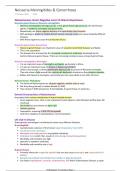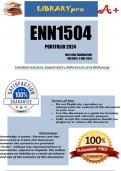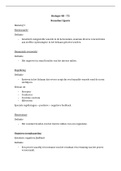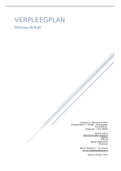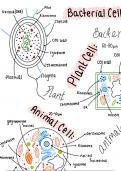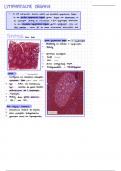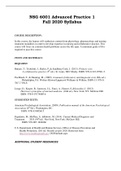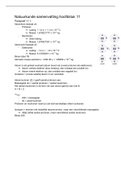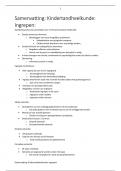27 October 2020 22:26
Neisseriaceae: Gram-Negative cocci of clinical importance
Neisseria gonorrhoeae vs Neisseria meningitides
○ Neisseria meningitidis (meningococcus) and N. gonorrhoeae (gonococcus), the well-known
agents of epidemic meningitis and gonorrhoea.
○ Respectively, are Gram-negative bacteria that specifically infect humans
○ Both pathogens prefer to inhabit distinct human mucosal niches and cause markedly different
diseases.
○ Both these organisms cause the production of pus
Neisseria gonorrhoea: Gonorrhoea
• Neisseria gonorrhoeae is an important cause of sexually transmitted diseases worldwide.
• This is not capsulated
• The diseases are worsened by the increased resistance to antibiotics developed by the
bacteria Neisseria gonorrhoeae. There are increasing resistance cases arising of gonorrhoea.
Neisseria meningitides: Meningitis
• It is an important cause of meningitis worldwide, particularly in Africa.
• It is also an important cause of disease in babies and children.
• Under a microscope, it shows polymorphs diplococcoid structures of Neisseria meningitis.
They also show a halo around their polymorph diplococci structure as they produce capsules.
• Babies with Neisseria meningitis can be fatal and can cause death in less than 24 hours.
Neisseriaceae: Phylogeny
The family of Neisseriaceae are all gram negative, aerobic rods or cocci.
But they also grow well in carbon dioxide (5-10%).
They contain 5 different genera: N.meningitidis, N. gonorrhoea, N. lactamica.
General Characteristics of Neisseriaceae:
Associated with mucous membranes of warm blooded animals.
○ Gram-negative cocci, often in pairs (diplococci) with adjacent sides flattened (coffee bean life
structure)
○ Not motile but are twitchy via type 4 pili
○ Oxidase positive
○ Capnophilic, requiring 5-10% CO2 for growth
○ Acid from oxidation of carbohydrates, not fermentation
Life style Vs Disease
Share genetic and antigenic similarities but have very different lifestyles.
N.meningitidis:
Asymptomatic coloniser of the human Upper Respiratory Tract (URT)
Accidental human pathogen
Meningitis and septicaemia in susceptible individuals
Endotoxic shock which then results in limbs being removed (amputation)
Morbidity and mortality very high
Sporadic or epidemic outbreaks
Morbidity and mortality rate is high
N.gonorrhoeae:
Primarily infects the urogenital epithelia but can also cause pharyngitis and conjunctivitis (in
babies)
Sexually transmitted/ transmitted from mother to baby during birth
Can lead to epididymitis, cervicitis, endometriosis, PID (Pelvic Inflammatory Disease, a major
cause of infertility)
N.Meningitis^J Gonorhoea Page 1
, cause of infertility)
Persistent and asymptomatic diseases common (especially in women) but men have it too
(men experience burning sensation).
In rare cases disseminate gonococcal infection (DCI), arthritis and endocarditis
Carriage of N.meningitidis
- Understanding of carriage (10-35%, some university students up to 55%) is crucial to
understanding meningococcal disease and prevention.
- The human nasopharynx is the sole ecological niche.
- It leads to the inflammation of the brain.
- Horizontal gene exchange and recombinant events during residence in the human
nasopharynx results in antigenic diversity.
- Successful clones are capable of wide global spreading and may be associated with explosive
epidemics of invasive disease.
- Carriage offers some immunity (how does this impact on control strategies?)
Meningococcal meningitis
The meninges are the membranes covering the brain and spinal cord.
Meningitis: inflammation of the meninges
Signs and Symptoms:
○ Vomiting
○ Excruciating intense headache (escalated cerebrospinal fluid pressure)
Other symptoms may include:
○ Confusion
○ Drowsiness
○ Fever
○ Sensitivity to light
○ Skin rash
Eventually leads to:
○ Neck stiffness (nerves along the spine become increasingly irritated)
○ Convulsions (involuntary contractions of muscles)
If untreated, fluid build-up in the ventricles of the brain, which can result in a loss of consciousness
or even death.
Diagnosis: Meningococcal Clinical signs
You need to be very quick as meningococcal disease can kill within 4 hours!
Antibiotics must be given ASAP! N.meningitidis is very sensitive to antibiotics.
Non-clinical test: The glass test to see if the rash change
Babies and Toddlers
Symptoms & Signs:
• Fever (cold hands and feet)
• Refusing food or vomiting
• Fretful, dislike of being handled
• Pale blotchy skin
• Blank, staring
• Drowsy
• Stiff neck
• High pitched
Neisseria Gonorrhoeae: The Gonococcus
- Discovered in 1879 by Albert Neisser
- It is non-capsulated
- Causes very risk resistance to antibiotics
- Type 4 pilin adhesin is major virulence factor
- Causes a sexually transmitted infection
N.Meningitis^J Gonorhoea Page 2

